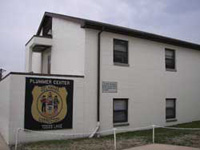Plummer Community Corrections Center
Dorene Fields, Warden
Wayne Wilson, Deputy Warden
Wilmington, DE 19802
phone: (302) 761-2800
fax: (302) 577-2849

Work Release
Work Release provides a structured program that presents an opportunity and means for reintegration through participation in work and through participation in DOC-facilitated training, skill building, and counseling programs.
An offender enters the work release program by order of a court or is classified to participate by DOC officials. Offenders normally stay in work release less than one year, with the average stay of four to six months. Work release participants typically work for private employers. They must display pro-social behaviors such as honesty, responsibility and accountability. Random substance abuse testing is mandatory throughout their stay at PCCC. While employed full-time, offenders must pay a $25 per week room and board fee and $25 toward any court obligations that include costs, fines, child support and victim compensation. Persons working part-time pay $15 per weekly for the same obligations.


